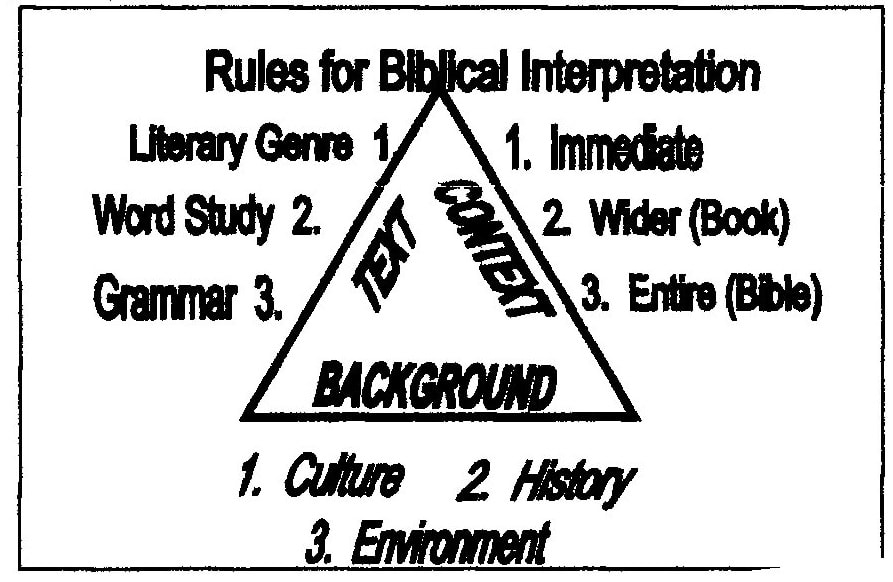Hermeneutics – the Study of Biblical Interpretation
A Bible Study by Kurt Van Gorden
In theological studies it is important to properly interpret the Bible. In this study, I provide several biblical examples to show that Jesus and the apostles used the same “Historical-Grammatical Interpretation” method that most evangelical and conservative Christians use today.
I am never surprised when someone rejects what the Bible by appealing to interpretation as an escape route with words like, “Well, that’s just your interpretation.” I always answer it with, “The difference between us is that I have solid reasons for my interpretation, but you have no reason to reject it.” Once we understand that Jesus and the apostles actually showed us how to read and understand the Bible, then you will not fear sharing with others who may reject His Word. With careful exegetical study and by applying good hermeneutic principles, you can be confident in your understanding of His Word—the Bible.
(Coordinate the following with the diagram below)
I am never surprised when someone rejects what the Bible by appealing to interpretation as an escape route with words like, “Well, that’s just your interpretation.” I always answer it with, “The difference between us is that I have solid reasons for my interpretation, but you have no reason to reject it.” Once we understand that Jesus and the apostles actually showed us how to read and understand the Bible, then you will not fear sharing with others who may reject His Word. With careful exegetical study and by applying good hermeneutic principles, you can be confident in your understanding of His Word—the Bible.
- Why do we need to study our Bible?
- Our doctrines have a divine origin (John 7:16).
- Our doctrines are outlined in Scripture (2 Timothy 3:16).
- We must continue in sound doctrine (1 Tim. 4:16).
- We guard doctrine by the Holy Spirit (2 Tim. 1:13-14).
- We hold sound doctrine (Titus 1:9).
- The Bible is God’s infallible word (Hebrews 6:18).
- Essential doctrines are those necessary for salvation.
- It directly affects our relationship to God (1 Jn. 2:23-24).
- It must center on the true Jesus, true Holy Spirit, and the true Gospel (2 Corinthians 11:4; Galatians 1:6-9).
- Bible teachers bear a heavy responsibility to teach doctrine correctly (James 3:1; 1 Tim. 6:3-5).
- However, some variation on “non-essential” doctrines (doctrines other than salvation matters) is permissible between Christian believers without affecting our standing with God (Romans 14:1-5 – his own mind; Colossians 2:16; 1 Corinthians 13:9-10 – we know in part).
- Sound doctrine in essential things is not private interpretation. Scripture best interprets Scripture; as the Westminster Con-fession (1:9) states, “The infallible rule of interpretation of Scripture is the Scripture itself.”
- There are proper and improper ways to approach Scripture. As evangelical Christians we believe that God spoke plainly for Himself, so we take his Word primarily in a plain sense, as in any regular commun-ication. I often tell people to read the Bible like any other non-fiction. The Self-Interpreting Bible (1873) instructs readers to “Ascertain …the plain, literal and primary meaning of Scripture [and] make all allowance for idiomatical and figurative diction….”
- We must use proper rules for interpretation, which are exemplified by Jesus and the Apostles. We take the Bible in its “plain, literal and primary meaning” (a boat is a boat), yet recognizing metaphors where applicable. This is the Historical-Grammatical hermeneutic. God did not write His Word as some mystical secret, but He spoke plainly for normal people to understand Him.
(Coordinate the following with the diagram below)
- The TEXT is studied in three main ways:
- Literary genre—Jesus recognized figures of speech in John 6:48 and 15:5.
- Word studies—each word is important as seen in Matthew 5:18.
- Grammar—Paul emphasized the importance of the singular number of a noun in Galatians 3:16.
- The CONTEXT is studied in three main ways:
- Immediate context—the surrounding paragraph (example: the context of “perfect” in relationship to “love” in Matthew 5:48).
- Wider context—this considers the context of the entire book (Without the context of 1 John 1:7, one may wrongly interpret 1 John 3:6).
- Complete context—the context of the entire Bible must be considered. The context of Isaiah 40:10 and Psalm 139:1-6 prevents an erroneous interpretation of Genesis 3:9.
- The BACKGROUND is studied in three main ways:
- Cultural background--Matthew 1:18-20 gives the custom for calling a betrothed person a “husband” or “wife.”
- Historical elements—history and archaeology give evidence for historical verification and background (In John 19:23 Solomon’s porch was mentioned as a historical-archaeological fact, although it was built 1,000 years earlier).
- Environmental elements—the fauna, flora, geography, and topography plays an important role in interpretation (Luke 19:28 and Matthew 13:26).
Jude 3 Missions – Utah Gospel Mission
P. O. Box 780, Victorville, CA 92393
Compiled by Kurt Van Gorden © 1990, revised 2019, Jude 3 Missions
P. O. Box 780, Victorville, CA 92393
Compiled by Kurt Van Gorden © 1990, revised 2019, Jude 3 Missions
